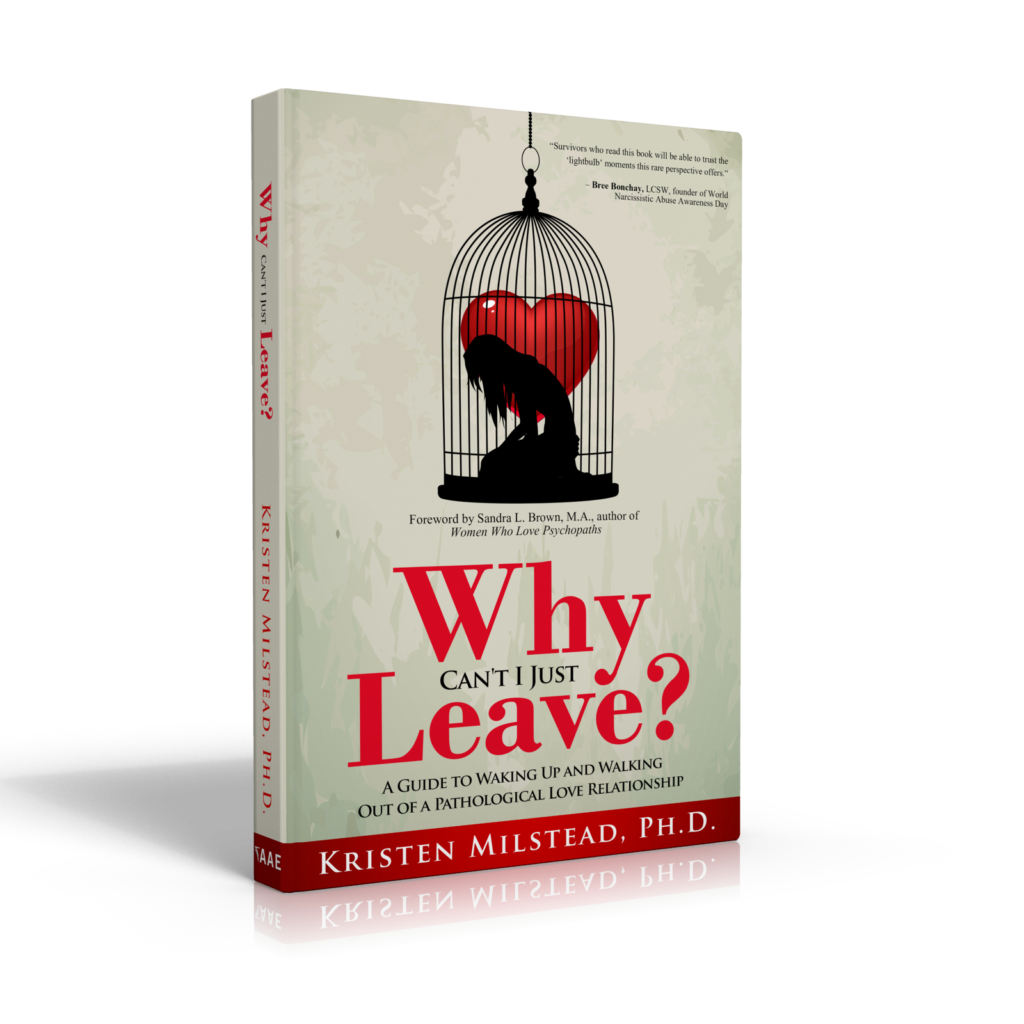Part of the reason why it’s so hard to break up with a narcissist is that the abusive dynamic with a narcissist is formed through a series of mostly small interactions over a long period of time.
Those interactions affect us in many ways and the reasons why we stay bound to our narcissistic partners even when we want to leave become complicated.
Here are six important concepts that explain narcissistic abuse in relationships.
Why We Can’t Break Up with a Narcissist

The methods narcissists use are the same ones advertisers use, the same ones casinos use to entice visitors to keep gambling away their cash. They are the same tactics criminal investigators use on suspects.
The methods show the psychology behind why it is so difficult for people to change their beliefs even when they are shown evidence that those beliefs are blatantly false. They show how propaganda works.
And yet we keep asking why their partners don’t just leave.
1. Intermittent Reinforcement
One day, he or she is loving and kind and the next, he or she is cruel and dismissive.
Experimental studies conducted on rats by behavioral scientists determined that the most effective schedule for producing desired behavior was an unpredictable one.
When the rats received a pellet of food every time they pulled a lever or at predictable times, they were less likely to do it because they always knew what to expect.
In terms of abusive situations, we are more likely to keep going back to or staying with the abuser if we aren’t sure how he or she is going to act from moment to moment. The narcissist provides “rewards” for behaving as groomed during the love-bombing stage, and punishments when you do not, such as when you challenge a narcissist’s lies. The punishments can take the form of raging, silent treatments (disappearing for long periods of time), threats, smear campaigns, hurtful comments, and others.
Shannon Thomas writes in Healing From Hidden Abuse, “Intermittent reinforcement is basically how people are brainwashed… This sort of conditioning trains survivors to anxiously anticipate when abusers will intermittently reinforce the connection between the two individuals. There is no rhyme or reason to their level of attention or affection. Sometimes it is based on the survivor playing by the abuser’s rules. Other times, abusers do not respond in the way that would have been expected.”‘
This is not something that survivors of abusers just “fall for” because they are a unique category of individuals who got involved with abusers or even just because they are being abused. This is a psychological principle that affects us all.
The same concept keeps people in casinos pumping money into slot machines, or even checking Facebook for comments or checking their E-mail to see if they have received any.
2. Biochemical Dysregulation in Our Brains
Another reason that makes it difficult to leave narcissistic abusers are the biochemical bonding disruptions, which Shahidi Arabi (p. 165-174) describes in Becoming the Narcissist’s Nightmare.
The hormone oxytocin and the neurotransmitter dopamine cause positive feelings to flow throughout the brain and body and promote bonding with others. These become dysregulated and synced up with the intermittent reinforcement of the narcissist’s behavior.
For example, dopamine “flows more regularly when rewards are given on an unpredictable schedule,” such as when an abuser explodes after the survivor has been walking on eggshells or disappears with a silent treatment only to return and pretend as if nothing has happened.
3. Learned Helplessness
The trauma of the abusive relationship also changes the structure of the brain to have other effects as well.
Sandra L. Brown, author of Women Who Love Psychopaths (p. 224) writes that in some relationships, “the women are too impacted by Post Traumatic Stress Disorder (PTSD), depression and other symptoms to be able to initiate and carry out the disengagement process which requires a level of functioning she does not currently have.”
(Please note that her conclusions are general enough to apply to all individuals who have been in relationships with psychopaths and I am using them as such).
There are important reasons why PTSD and other mental health issues have this effect.
As Arabi (p. 162-63) also states in Becoming the Narcissist’s Nightmare, this is because traumatic memories stay lodged in the areas of the brain that are responsible for executive functioning. These are the areas that are associated with logical tasks that require reasoning and planning.
The result is that these areas of the brain shrink and stop functioning in the manner they once did, sometimes shutting down.
The women instead become “paralyzed,” and unable to do anything because of the trauma.
In experimental studies, dogs that were caged and repeatedly shocked when they tried to escape gave up trying and became so traumatized that they didn’t even try to escape when they were given the chance.
This mindset is called “learned helplessness.”
It’s an adaptation to trauma that results due to changes to brain structure that make it difficult for a person to function as they would if they could access and use all areas of their brain at a normal capacity.
4. Stockholm Syndrome and Trauma Bonding
A trauma bond is one in which a person develops loyalty to a person who is harming them. The bond is created when the narcissist repeatedly comes into the victim’s life and alternates between performing traumatizing and loving acts. This keeps the victim tied to that person with an elusive promise of a future where the harm will stop.
Yet each period of kindness is another false start. The victim lives in a state of perpetual misery because he or she is always waiting for the future that never arrives. Only the narcissist can rescue them from their pain, despite the fact that he or she was the one who caused it in the first place.
In the book Women Who Love Psychopaths (p.227), Brown writes, “Many of the women have the same symptoms seen in other types of conditions associated with emotional manipulation or psychological torture such as Stockholm Syndrome, cult programming, psychological warfare, coercion, mind control, and trance logic thinking.”
She describes how psychologically the women experience the four dynamics of Stockholm Syndrome:
(1) perceiving a physical or psychological safety threat that the abuser is able to carry out;
(2) unconsciously seeing her abuser as vulnerable and letting down her guard when he acts in kind ways;
(3) undergoing a change in thinking that becomes delusional.
This happens because he is able to distort her reality by indoctrinating her with his pathological worldview while simultaneously isolating her from outside perspectives that would challenge his ideas; and
(4) developing a perspective that she is unable to leave because the abuser has convinced and conditioned her through various tactics that she cannot escape from him.
All of these things work together to keep the survivor “on the abuser’s side.”
We as survivors develop a loyalty to the very person who is hurting us called a “trauma bond.”
We hide their abuse, find ways to rationalize their abusive behavior, focus on the positive connection and do what we can to try to stay in their lives, and have irrational thoughts about how we are forever tied to them.
5. Identity Erosion
A long period of time in the relationship leads to identity erosion. Our personalities slowly start to change from what it was prior to the relationship.
Jackson MacKenzie includes an entire chapter in his book, Psychopath Free, about identity erosion, in which he describes the multitude of tactics narcissists use that erode the identities of their partners (p. 38-83).
These include (among others):
- manufacturing emotions that otherwise wouldn’t exist by saying or doing dramatic, confusing or untrue things to provoke those reactions;
- ignoring boundaries until we do things we never thought we would do; and
- using a combination of conversational tactics to make us feel fearful of expressing ourselves because of how the narcissist will react.
Narcissists also begin to criticize the very characteristics of the partner that he or she once praised. Where once the narcissist exalted and complimented, now he or she demeans and humiliates, holding back none of the contempt.
Partners of narcissists learn how to confine and smother a large part of their personalities and respond in new, unfamiliar ways that are unlike they would normally respond.
Then the narcissist implants themselves in that spot where the lost identity has been drained away.
The narcissist’s preferences, needs, and desires now control and motivate that aspect of his or her partner, convincing the partner that this relationship is what he or she wants.
6. Cognitive Dissonance
Almost since I began this blog, I have been writing about how narcissists split us in two, as we try to decide: is the narcissist “good” or “bad?”
The technical term for this is cognitive dissonance, which is the mental anxiety felt when we hold two conflicting beliefs.
We resolve them by coming to a conclusion somehow about which one is correct by rationalizing, ignoring evidence, denying, or some other psychological mechanism.
With cognitive dissonance, usually, the belief or idea we encountered first is the most resistant to change, as it is older and provided the foundation for so many other of our beliefs afterward. It makes more sense.
Narcissists literally show us two people–the one who was our soulmate at the beginning and then morphs into the one who holds us in contempt, looks at us with hatred, and does things to us you didn’t even know people would be capable of doing to their enemies.
Cognitive dissonance literally becomes a mindset, the dominant state by which we filter all stimuli.
Yet cognitive dissonance causes us not to be able to see the narcissist clearly.
The stage for it is set almost immediately with the love-bombing we receive at the start of the relationship. Though the other five things that help explain narcissistic abuse in relationships are very important, they develop over time.
Cognitive dissonance, however, begins with the first negative incident and precedes all of the other five things that help bind us to our partners. In fact, cognitive dissonance is what straps us in place so that the other five can take hold.
It can also linger after the relationship ends.
Once we go no-contact with our partners, we are left trying to piece together what happened, how so many actions that did not align could have taken place.
They can keep us guessing about whether the abuse took place and our role in it, the same lack of awareness or denial that has existed since the first moment we entered the relationship:
“What makes psychopathy so different, so surreal, so much like a relational bitchslap that it nearly knocks her head off?
- The sensation of being emotionally ‘jumped’ from behind.
- The inability to wrap her head around the emotional-physical-spiritual-sexual gang-bang that just happened when she thought she was with the most wonderful person.
“No one can figure out how a dangerous psychopath curled up to them like a purring cat. Half of recovery is just trying to figure out ‘what was THAT?’ The longest portion of therapy is always helping the woman understand ‘what’ the psychopath is. What he does, how he feels, how his brain thinks, what he says, what is that his core– all these traits are far outside the average person’s experience. To understand what happened to her she must learn to understand his peculiar traits” (Brown, p. 49).
To truly break up with a narcissist psychologically even after the relationship ends, the cognitive dissonance must be overcome.
These instincts were activated and then conditioned to work against us so that we could be potentially exploited forever.
Enjoying this post? Please take a moment and subscribe to this blog to get all future articles delivered to you before continuing to read below. Thank you!
Don’t forget to check out these resources on the website while you’re here:
- Taking Your Life Back After a Relationship With a Narcissist (Free ebook)
- Comprehensive Narcissistic Abuse Dictionary
- Narcissistic Abuse Resources for Recovery
Sources
Arabi, S. (2015). Becoming the Narcissist’s Nightmare. New York: SCW Archer Publishing.
Brown, S.L. (2009). Women Who Love Psychopaths. Minneapolis, MN: Mask Publishing.
Mackenzie, J. (2015). Psychopath Free. Berkeley: Penguin Random House.
Thomas, S. (2016). Healing from Hidden Abuse. Tempe, AZ: MAST Publishing House.






38 Comments
Denise
Thank you for the article. I have been in a 31/2 year relationship with an emotionally unavailable man. He is never verbally abusive, nor does he criticize me. He does intermittently reinforce my belief in the relationship, then runs if we get too close. He finally admits to the
Panic he feels. He does not set talk me, in fact, is emotionally baron. He gives small amounts of love and attention as I finally broke it off and was no contact for ten months. He came to tell me goodbye when he moved to a different state. It was seemingly very emotional for us both. Two months later he contacted me and told me all the things I had longed to hear. I feel back into a long distance relationship. We discussed plans for him to move back. He became moody and distant. He finally broke sobbing that he was afraid he’d move here, be unhappy, and leave me. He stays in a state of dichotomy. This leaves me in limbo. So many things I’ve told myself about this man. I’m not sure if he had much to do with it. He keeps me anxious by moving close, then putting distance, both emotionally and physically. It has caused me much pain, even the ten months we were broken up. Many of the facts in your article ring so true.
Kristen Milstead
Hi Holly: I’m glad that you’re here, and so sorry to hear your story and what you are going through. I know this feeling of “denial” you are having, and am hoping for you to soon find your way out as well. You are not alone, and there is a path forward. Please take care of yourself. -Kristen
Holly
Just found your blog today and reading several of them is helping me to realize who the stranger is that I once thought I knew so well after 20 yrs of marriage. Learning about cognitive dissonance makes so much sense of what I have been going through. The covert narc I married is like Jekyll and Hyde and I never know which one will appear at any given time. Definitely keeps me jumpy. Thank you for helping me to learn more about this horrendous form of abuse. Hopefully I will stop being in denial and find my way of escape before it’s too late. I will continue reading your blogs.
Holly
Just found your blog today and reading several of them is helping me to realize who the stranger is that I once thought I knew so well after 20+ yrs of marriage. Learning about cognitive dissonance makes so much sense of what I have been going through. The covert narc I married is like Jekyll and Hyde and I never know which one will appear at any given time. Definitely keeps me jumpy. Thank you for helping me to learn more about this horrendous form of abuse. Hopefully I will stop being in denial and find my way of escape before it’s too late. I will continue reading your blogs.
Kristen Milstead
Hi Holly: I’m glad that you’re here, and so sorry to hear your story and what you are going through. I know this feeling of “denial” you are having, and am hoping for you to soon find your way out as well. You are not alone, and there is a path forward. Please take care of yourself. -Kristen
Kristen Milstead
Hi Tania. I’m glad you enjoyed this article. Thank you for reading, and thank you for being here. Stay safe! -Kristen
Kristen Milstead
Hi Yagit. I’m sorry to hear of what you are going through. It sounds incredibly painful to recognize what is going on and why, but still have to limit the closeness with your own mother to keep yourself safe. It is great that you have reached a point to where you are able to create and enforce that boundary for yourself. I’m glad to hear that my article helped in some way. Thank you for being here, although I’m sorry it had to be under such circumstances. Stay strong. -Kristen
Kristen Milstead
Hi April: I am so sorry for what you are going through and I can empathize as I remember so well, as my story is so very similar. It’s hard to see the big picture while we are in it because of the brain fog. The daily interactions with them literally change our brains and keep us tied there, making it difficult for us to make changes in our lives. I hope that putting together in one place in the article the various things that are happening and in what order and why helps make sense of why we feel so unhappy. I am only now starting to be able to understand it and put it together in new ways so I strive to put them in writing, in case they help others. The way I see it is that we literally get pulled in two different directions, and the one that will save us is the harder choice to make because of all of the things working against us– but it can be done! Please stay safe. -Kristen
April
I feel at times I’m in this type If relationship. What once was so inviting now feels like a nightmare. I’m constantly criticized now and told daily that I’m not doing anything right. At the beginning I was told how beautiful I was and motivated and a wonderful person. This person will do nice things for me then the next day act like I don’t exist and then threatens terminating the relationship when I try and stand up for myself. I feel lost and depressed now whereas I used to feel capable and happy. I don’t know how to completely disconnect from this person because I have been isolated. I think though this article has helped me to look inside myself and realize I am being manipulated. Thank you!
April
I feel at times I’m in this type If relationship. What once was so inviting now feels like a nightmare. I’m constantly criticized now and told daily that I’m not doing anything right. At the beginning I was told how beautiful I was and motivated and a wonderful person. This person will do nice things for me then the next day act like I don’t exist and then threatens terminating the relationship when I try and stand up for myself. I feel lost and depressed now whereas I used to feel capable and happy. I don’t know how to completely disconnect from this person because I have been isolated. I think though this article has helped me to look inside myself and realize I am being manipulated. Thank you!
Kristen Milstead
Hi April: I am so sorry for what you are going through and I can empathize as I remember so well, as my story is so very similar. It’s hard to see the big picture while we are in it because of the brain fog. The daily interactions with them literally change our brains and keep us tied there, making it difficult for us to make changes in our lives. I hope that putting together in one place in the article the various things that are happening and in what order and why helps make sense of why we feel so unhappy. I am only now starting to be able to understand it and put it together in new ways so I strive to put them in writing, in case they help others. The way I see it is that we literally get pulled in two different directions, and the one that will save us is the harder choice to make because of all of the things working against us– but it can be done! Please stay safe. -Kristen
Yagit
Wow, how eye opening and articulately put. I have a mother who does not accept that her mother is a narcissist. Unfortunately, her mother stroked out and is paralyzed on the right side of her body and now my mother is her fullntime care provider. My relationship with my mother is limited due in fact she emulates her mother and tries to force her similar relationship onto me. The strain is that we are both faith base and at times the faith is used to enforce on me. I’d rather have a limited relationship with my mother than to give in to this madness. Thank you for this sharing this article, I am learning more and more about this disorder and healing from childhood hardships resulting from my Nana’s narcissim.
Yagit
Wow, how eye opening and articulately put. I have a mother who does not accept that her mother is a narcissist. Unfortunately, her mother stroked out and is paralyzed on the right side of her body and now my mother is her fullntime care provider. My relationship with my mother is limited due in fact she emulates her mother and tries to force her similar relationship onto me. The strain is that we are both faith base and at times the faith is used to enforce on me. I’d rather have a limited relationship with my mother than to give in to this madness. Thank you for this sharing this article, I am learning more and more about this disorder and healing from childhood hardships resulting from my Nana’s narcissim.
Kristen Milstead
Hi Yagit. I’m sorry to hear of what you are going through. It sounds incredibly painful to recognize what is going on and why, but still have to limit the closeness with your own mother to keep yourself safe. It is great that you have reached a point to where you are able to create and enforce that boundary for yourself. I’m glad to hear that my article helped in some way. Thank you for being here, although I’m sorry it had to be under such circumstances. Stay strong. -Kristen
Tania
This is a great article, it explains a way to break free from this horrible abuse. I can’t stop thinking why can’t i break free if I know is a lost case. I clearly see the connection with the intermittent reinforcement bs that narcissist apply, it’s very true. Thank you for sharing this knowledge.
Tania
This is a great article, it explains a way to break free from this horrible abuse. I can’t stop thinking why can’t i break free if I know is a lost case. I clearly see the connection with the intermittent reinforcement bs that narcissist apply, it’s very true. Thank you for sharing this knowledge.
Kristen Milstead
Hi Tania. I’m glad you enjoyed this article. Thank you for reading, and thank you for being here. Stay safe! -Kristen
The Biggest Weapon Narcissists Use Against Us: Our Own Minds | In the Shadows of the Fairy Tale
[…] my last article, I described some of the reasons that it is so difficult to leave a narcissist and how all of those […]
Vesta
I guess I’m not the only one who notices your special gift to describe something so complex, raw and indescribable! Reading your articles make me feel sane because you describe the hell we went through so well…I’ve said all this before ? You ROCK!!!!
Kristen Milstead
Thank you, Vesta. I am really glad that what I wrote makes you feel this way.
Vesta
I guess I’m not the only one who notices your special gift to describe something so complex, raw and indescribable! Reading your articles make me feel sane because you describe the hell we went through so well…I’ve said all this before ???? You ROCK!!!!
Kristen Milstead
Thank you, Vesta. I am really glad that what I wrote makes you feel this way.
Pete
Kristen, your insight is frighteningly accurate, I’m so grateful I found your blog. You’re helping me find a path out of this confusing, nightmarish quagmire, in very real and practical terms, you’re saving my life, thank you so very much.
Kristen Milstead
Hi Pete: I’m so very glad that my articles have been so helpful for you. Thank you for reading them and for taking the time to let me know. I hope that you are able to find some peace and keep moving out of the confusion. -Kristen
Pete
Kristen, your insight is frighteningly accurate, I’m so grateful I found your blog. You’re helping me find a path out of this confusing, nightmarish quagmire, in very real and practical terms, you’re saving my life, thank you so very much.
Kristen Milstead
Hi Pete: I’m so very glad that my articles have been so helpful for you. Thank you for reading them and for taking the time to let me know. I hope that you are able to find some peace and keep moving out of the confusion. -Kristen
Spocks Daughter
OUCH
You have done IT again ‘sister’s!
Going to digest this one slowly no doubt!!
PS looking into…’Vagel Tone’ anxiety management, nervous breakdown yadda yadda
Spocks Daughter
Kristen Milstead
Hi! I’m sorry to hear about what you are going through, but I am glad to hear that you may have found something that seems hopeful for relief. -Kristen
Spocks Daughter
OUCH
You have done IT again ‘sister’s!
Going to digest this one slowly no doubt!!
PS looking into…’Vagel Tone’ anxiety management, nervous breakdown yadda yadda
Spocks Daughter
Kristen Milstead
Hi! I’m sorry to hear about what you are going through, but I am glad to hear that you may have found something that seems hopeful for relief. -Kristen